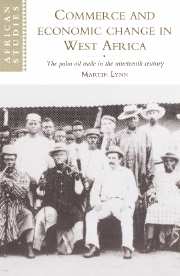Book contents
- Frontmatter
- Contents
- List of maps
- List of tables
- Preface
- List of abbreviations
- Introduction
- Part I The development of the palm oil trade in the first half of the nineteenth century
- Part II The restructuring of the palm products trade in the second half of the nineteenth century
- 5 Technological change, the British market, and African producers
- 6 British traders and the restructuring of the palm products trade
- 7 African brokers and the struggle for the palm products trade
- 8 The coming of colonial rule and the ending of legitimate trade
- Conclusion
- Notes
- Select bibliography
- Index
- Other books in the series
7 - African brokers and the struggle for the palm products trade
Published online by Cambridge University Press: 04 December 2009
- Frontmatter
- Contents
- List of maps
- List of tables
- Preface
- List of abbreviations
- Introduction
- Part I The development of the palm oil trade in the first half of the nineteenth century
- Part II The restructuring of the palm products trade in the second half of the nineteenth century
- 5 Technological change, the British market, and African producers
- 6 British traders and the restructuring of the palm products trade
- 7 African brokers and the struggle for the palm products trade
- 8 The coming of colonial rule and the ending of legitimate trade
- Conclusion
- Notes
- Select bibliography
- Index
- Other books in the series
Summary
The second half of the nineteenth century was to be a difficult time for the brokers of the palm oil trade. If the early part of the century was a period of growth and prosperity for brokers, the later decades were to be much more mixed. Partly these difficulties were due to the impact of the fall in oil prices after 1861 but partly, too, they were due to the changes generated in the organisation of the trade by the steamship services. The commencement of the steamship services in 1852 brought as many changes on the African side of the export trade as it had on the British. While facilitating the expansion of oil exports across much of the region and thereby confirming palm oil's place in West Africa's economy, the steamer services also set in motion changes that raised questions about the future structure of the trade and the place Africans were to hold in it.
As we have seen, these were years of considerable growth in the volume – and until the mid-1870s, the value – of palm oil exports from West Africa. This growth in exports must have had an important impact on those sectors of West Africa involved in the export trade in the second half of the century. While there is little precise evidence to show price levels on the coast, it can be suggested that incomes of palm producers and brokers would be likely to have grown while the values of the trade continued to expand. This can be seen reflected in the corresponding growth in import values for West Africa in this period. Again, reliable figures are difficult to come by, but Eltis and Jennings calculate an increase in Africa's.
- Type
- Chapter
- Information
- Commerce and Economic Change in West AfricaThe Palm Oil Trade in the Nineteenth Century, pp. 151 - 170Publisher: Cambridge University PressPrint publication year: 1997



